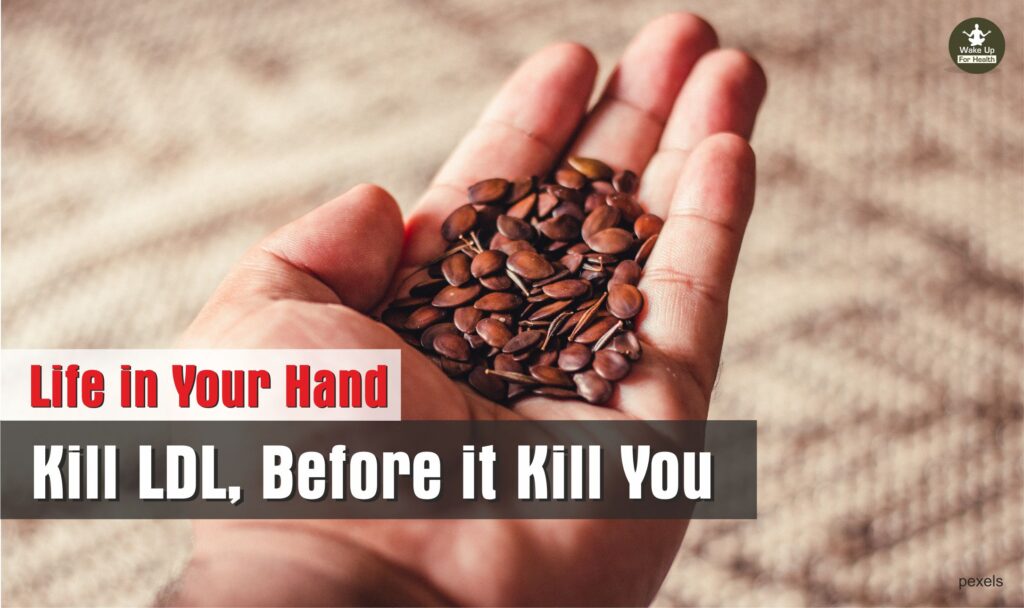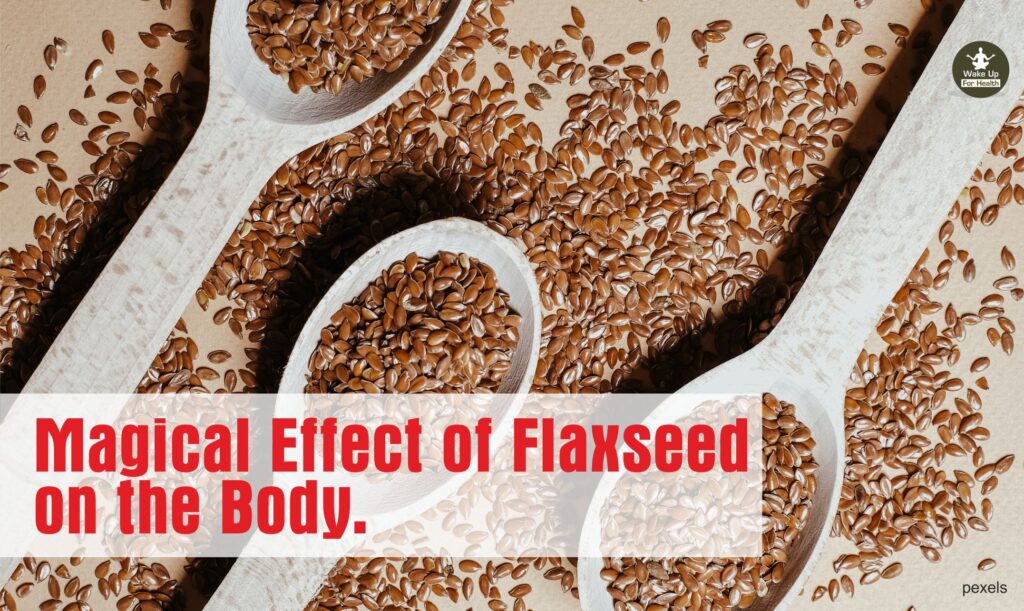Flaxseeds are rich in omega 3, omega 6 fatty acids, fiber and protein and all these nutrients are known to lower cholesterol. Consuming it daily reduces the bad cholesterol stored in the blood, which also reduces the risk of heart diseases.

Due to today’s unhealthy lifestyle, people are increasingly becoming victims of high cholesterol disease. Cholesterol increases in the body due to consumption of high fat food, lack of exercise, obesity, smoking and drinking, which gradually makes the body home to many diseases.
Understanding Bad Cholesterol, Heart Health, Cholesterol Reduction, Dietary Changes
However, increasing bad cholesterol (LDL) in the body can be prevented by paying attention to your diet and lifestyle, and if you are already suffering from this disease, then you should immediately change your lifestyle. Today, in this article, we will tell you how linseed can reduce the bad cholesterol in your blood.
How Flaxseed Fights With Cholesterol?
People have been using linseed in their diet since ancient times. Along with linseed, its oil is also used. It has been widely consumed in Greek, Roman, Egyptian, Chinese and Indian civilizations. Flaxseed is rich in omega 3 and omega 6 fatty acids, soluble fiber and protein. All these nutrients eliminate bad cholesterol, which reduces the risk of heart disease.
Surprising Results Found in the Research Done on Flaxseed.
According to a study conducted by the American Society for Nutrition in 2015, the consumption of flaxseed in the diet reduces the increasing cholesterol in the body. It also prevents the progression of Peripheral Artery Disease (PAD, in which the arteries of the blood become constricted and reduces blood flow). At the very beginning of this research, the team found a 15 percent reduction in the prevalence of bad cholesterol due to flaxseed in PAD patients, which surprised them.
It Also Beneficial : 7 Easy Ways To Quit Addiction | How To Quit Alcohol By Ayurvedic Way
Linseed is Rich in These Nutrients.
Flaxseeds are rich in Alpha-Linolenic Acid (ALA), which improves blood flow and reduces the risk of heart disease. Along with this it is also rich in EicosaPentaenoic Acid (EPA) and DocosaHexaenoic Acid (DHA). All these three acids are known to reduce bad cholesterol. That’s why linseed is a magical medicine for cholesterol disease. One cup or 100 grams of flaxseed contains 20 percent protein, 28 percent fiber, 18 percent monounsaturated (MUFA) and 73 percent polyunsaturated fat (PUFA).
It contains 57% ALA and 60% linoleic acid. The human body cannot produce omega 3 fatty acids, so you can get omega 3 fatty acids by including linseed in your diet. The soluble substances found in linseed work to keep the heart healthy by taking out the dirty cholesterol from the blood.
Magical Effect of Flaxseed on the Body.

Ground flaxseeds have been shown to reduce bad cholesterol in people with peripheral artery disease, and when combined with cholesterol-lowering medications, they have the ability to reduce excess cholesterol without affecting the cholesterol in the body. Huh. Not only this, it also helps in keeping your blood pressure under control. There is no doubt that flaxseeds are great for lowering bad cholesterol and good for heart health. Flaxseed also helps in getting rid of constipation and many stomach ailments. For this reason, flaxseed is said to be one of the most nutritious foods found on earth.
How Much Flaxseed Should Consume Daily?
According to health experts, one teaspoon of flaxseed should be used every day in the daily diet. But never eat flaxseed raw, always roast it first and then consume it. To get its benefits, it is necessary to eat it in the right form. You can eat it by roasting it with many more dry fruits and whole seeds. After roasting linseed seeds, grinding them finely, it can also be eaten by mixing it in Smoothies, Halwa, Porridge, Laddoos and Curd. In general, it is not advisable for everyone to consume flaxseed oil as it contains excessive amount of acids, which can have adverse health effects if consumed in the wrong quantity.
Also Read it : Ayurveda Vs Allopathy | Is Ayurveda Better than Modern Medicine?
7 Rich Benefits of Roasted Flax Seeds (Ultimate Health Benefits)

Brain Booster
You roast flaxseeds and eat them on top of your lentils and rice or on snacks. This will increase your brain power. Actually, flaxseeds are high in omega-3 fatty acids and omega-6 fatty acids, which help in boosting the brain rapidly. It keeps your brain cells healthy and sharpens your brain. This increases your thinking and understanding power.
Helpful in Weight Loss
If you want to lose weight, then roast flax seeds and eat it after every meal. This will have two advantages. Firstly, its protein will reduce your appetite and prevent cravings. The second advantage will be that its fiber will speed up your metabolism and help in the process of weight loss faster. In this way, both these things together will help you to control weight.
Having High Cholesterol
If your cholesterol remains high, then you should roast flaxseed and take one spoon in the morning and one spoon in the evening. In this way, it can also help in reducing the level of cholesterol. By consuming it regularly, it helps in reducing the level of LDL ie bad cholesterol. This keeps your blood pressure right and you stay away from heart diseases.
Be careful for : Do Not Make These 9 Mistakes During Meditation? | Dhyan Lagane Mein Na Karein Ye 9 Galtiyan.
Improve Sleep
Mix roasted flaxseed in a little milk or you can also make a powder and sprinkle it on top of the milk. Now drink it every night and sleep. You will find that it will improve your sleep. In fact, it promotes the production of serotonin hormone which is essential for regulating sleep. Apart from this, it also contains magnesium which improves sleep by reducing your stress.
Energy Booster
Sometimes you wake up in the morning and feel tired. Actually, it may be due to lack of energy in your body in which eating roasted flaxseed can be beneficial. It is such that the amount of protein in roasted flaxseed is high. When you fry it, you can eat it straight or make it into a light powder and add it to your bread or sandwich and eat it. In this way it will help in boosting your energy.
Beneficial for Skin and Hair
Roasted flaxseeds are rich in vitamin E, which helps keep both your skin and hair healthy. In fact, its omega fatty acids help in improving the quality of hair follicles and skin cells by providing adequate nutrition and controlling free radicals. These not only improve the texture of the hair but also promote the growth of new follicles. It also protects the face from damage caused by free radicals.
Get Rid of Constipation
The problem of constipation often troubles people. In such a situation, you can consume roasted linseed seeds to get rid of the problem of constipation. Actually, it has a high amount of fiber and when you fry it and eat it, it increases the amount of roughage in your stomach. In this way, it adds bulk to your stool and makes it soft. Due to which you get relief from constipation.
Who Should Not Consume Flaxseed?
People suffering from Kidney Diseases or High Potassium Levels should not eat it. Flaxseed should not be consumed even in case of any kind of allergy or inflammation. People suffering from any disease should also consume flaxseed only on the advice of the doctor. If you are taking any medicine or supplement, then definitely consult a doctor before consuming flaxseed.
(Disclaimer : This article is based on collected informations & studies, also to wake you up about your health. So verify with your doctor also to stay healthy and safe. Have a good day.)
2 thoughts on “Reducing Bad Cholesterol for Heart Health”